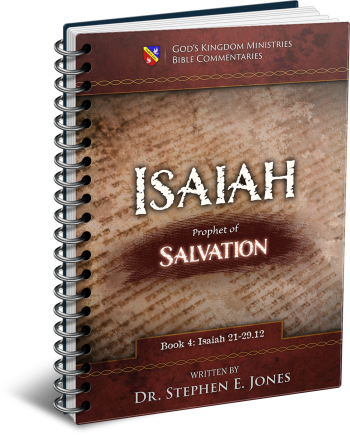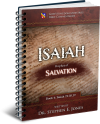Latest Posts
View the latest posts in an easy-to-read list format, with filtering options.

Isaiah is the prophet of Salvation. He is also known as the truly "Universalist" prophet, by which is meant that He makes it clear that salvation is extended equally to all nations and not just to Israel. He lived to see the fall of Israel and the deportation of the Israelites to Assyria, and he prophesied of their "return" to God (through repentance). He is truly a "major prophet" whose prophecies greatly influenced the Apostle Paul in the New Testament.
Category - Bible Commentaries

In Isaiah 27:1 the serpent called Leviathan attempts unsuccessfully to flee from the heel of the prophesied “seed” of the woman. The constellation Draco is a very long constellation, twisting and turning throughout the heavens, encompassing “a third of the stars” (Rev. 12:4). The overthrow of that serpent is pictured in Rev. 12:7-9, saying,
7 And there was war in heaven, Michael and his angels waging war with the dragon. The dragon and his angels waged war, 8 and they were not strong enough, and there was no longer a place found for them in heaven. 9 And the great dragon was thrown down, the serpent of old who deceives the whole world; he was thrown down to the earth, and his angels were thrown down with him.
John then “heard a loud voice in heaven,” which may have been a song of victory similar to the song in Isaiah 27:2-11 in the day that Leviathan, the “serpent” was cast down. Both Isaiah and John were seeing the same result of the victory over the dragon.
Isaiah 27:2 introduces his song this way:
2 In that day, “A vineyard of wine, sing of it!”
It appears that “A Vineyard of Wine” is the title of the prophet’s song.
Recall that Isaiah had already composed a “Song of My Beloved Concerning His Vineyard” in Isaiah 5:1-7. In that song, the vineyard as a whole was identified as “the House of Israel” (Isaiah 5:7), and Judah was “His delightful plant” within the vineyard.
So we know that the vineyard was a metaphor for the House of Israel, which was being exiled to Assyria. According to Heb. 11:15, 16 Israel was never to find its way back to the old land but instead sought the better country and the heavenly city that Abraham was promised.
Isaiah’s Song of Victory is in two parts. It starts with God singing and ends with a response from the vineyard itself. It reads this way in Isaiah 27:3-5 in the Ferrar Fenton translation:
The Lord sings:
3 I, the Lord, always guard her;
When I visit, I water,
I watch her by day and by night.
The Vineyard responds:
4 I have no wall round me!—
Who will make me a hedge?
In war I shall be ruined—
Would any then guard me?
Or strength, protect me?
Make me peace, or rest?”
Although Israel’s response expresses fear and doubt that God would protect her, God promises to “guard her,” even during Israel’s time of exile and wandering. Amos 9:8, 9 has a similar promise:
8 Behold, the eyes of the Lord God are on the sinful kingdom, and I will destroy it from the face of the earth; nevertheless, I will not totally destroy the house of Jacob,” declares the Lord, 9 “For behold, I am commanding, and I will shake the house of Israel among all nations, as grain is shaken in a sieve, but not a kernel will fall to the ground.”
The fact is that many generations died and were buried in the ground. Amos’ prophecy rings hollow for those who do not understand the resurrection of the dead. Those generations that fell in the long wilderness of Israel’s exile thought that “our hope has perished; we are completely cut off” (Ezek. 37:11). Yet the dry bones of the House of Israel were to come together, and life was to return to them (Ezek. 37:10).
We see, then, that God’s protection did not mean that Israel would avoid judgment for being a “sinful kingdom.” The nation would surely be destroyed, and people would indeed die. But nonetheless, God’s Kingdom would be preserved, and in the end, it would be populated by the righteous.
The intervening centuries, however, would give the appearance that the promises of God had failed. The tribes of Israel were “lost” and “forgotten.” Men assumed that the House of Judah was all that was left and that Judah, of necessity, had replaced Israel as the inheritors of the birthright of Ephraim-Joseph.
So the Jews today, who claim ancestry from the House of Judah, now claim to be Israelites and custodians of the birthright.
The vineyard’s response in Isaiah 27:4 complains, “I have no wall round me! Who will make me a hedge?” From her dark perspective, she cannot see God’s protection. She sees herself as fully vulnerable as a city without walls. “In war I shall be ruined,” she laments. Who would give me strength or protect me? Who would grant me peace or rest?
God’s response to this lack of faith is found in the next verses.
While men are short-sighted, God sees the end from the beginning. While men are short-lived, God is life itself. Men have difficulty seeing beyond their own lifetime; God is not bound by time and sees all of history in terms of His ultimate and certain victory.
Isaiah 27:6 (NASB) says,
6 In the days to come Jacob will take root, Israel will blossom and sprout, and they will fill the whole world with fruit.
In other words, the vineyard will indeed bear fruit as it was intended from the beginning. God had planted His vineyard in the land of Canaan in the time of Joshua. Isaiah 5:2 describes this:
2 He dug it all around, removed its stones, and planted it with the choicest vine. And He built a tower in the middle of it and also hewed out a wine vat in it; then He expected it to produce good grapes, but it produced only worthless ones.
Because the vineyard failed to bring forth suitable grapes, God said, “I will lay it waste” (Isaiah 5:6). Hence, the vineyard of Israel was destroyed, and the Israelites were exiled to Assyria. But in the end, God will indeed have His vineyard, and it will be fruitful, for that was the purpose for its planting in the days of Joshua (or Yeshua). The divine plan thus called for another Yeshua, known in Greek as Iesus and in English as Jesus, who would replant the vineyard and make it fruitful.
Whereas the first Joshua (Yeshua) was only a type and shadow, whose vineyard failed to bring forth the quality of fruit that God required, the last Joshua (Yeshua) was the antitype. His vineyard will indeed fulfill the requirement of God and will “fill the whole world with fruit.”
The birthright was composed of two main items: the Dominion Mandate (Gen. 1:26) and the Fruitfulness Mandate (Gen. 1:28). Christ’s first appearance was to secure the Dominion Mandate, which had been entrusted to Judah. Christ’s second appearance will be to secure the Fruitfulness Mandate entrusted to Joseph-Ephraim. Ephraim’s name means “fruitfulness,” or more literally, “a double portion of fruit.”
The physical tribe of Ephraim, being “natural” (psukikos, “soulish”), was unable to bring forth the fruit of the Kingdom. Paul tells us that the “old man” (KJV) or “old self” (NASB) is incapable of accepting the things of the Spirit (1 Cor. 2:14), because his father is Adam, who was made a living soul. To fulfill the terms of the Birthright, one must be begotten by God Himself, like Christ, as “a life-giving Spirit” (1 Cor. 15:45). These are truly the sons of God, whereas all “natural” birth from earthly parents falls short of the glory of God.
So Ephraim, along with the rest of the House of Israel, found it impossible to bring forth quality fruit from the vineyard that God planted through Joshua. Thus, the nation died.
The promise of resurrection did not mean that the old fleshly nation would be raised in the same state as it died. No, Paul says in 1 Cor. 15:42-44,
42 So also is the resurrection of the dead. It is sown a perishable body, it is raised an imperishable body. 43 It is sown in dishonor, it is raised in glory; it is sown in weakness, it is raised in power. 44 It is sown a natural [psukikos, “soulish”] body, it is raised a spiritual [pneumatikos] body…
In other words, the soulish body, given to us by our earthly parents, is not what is raised from the dead. That which is raised is the spiritual body that was begotten by the Spirit of God through the seed of the word (gospel).
So also is it with the House of Israel. The nation itself was “sown” in the earth as a “perishable body,” “sown in dishonor” and “in weakness.” This is not what will be raised from the dead.
The body that will be raised from the dead is the body of overcomers, who became members of the tribe of Judah by faith in Jesus the King of Judah, and who then grew to spiritual maturity to qualify as Israelites worthy of the birthright name.
These are the ones who form the resurrected vineyard at the first resurrection in Rev. 20:5, 6. God’s vineyard will then be expanded in the ages to come until it fills the whole world with fruit. This is the restoration of all things and the reconciliation of creation as a whole.